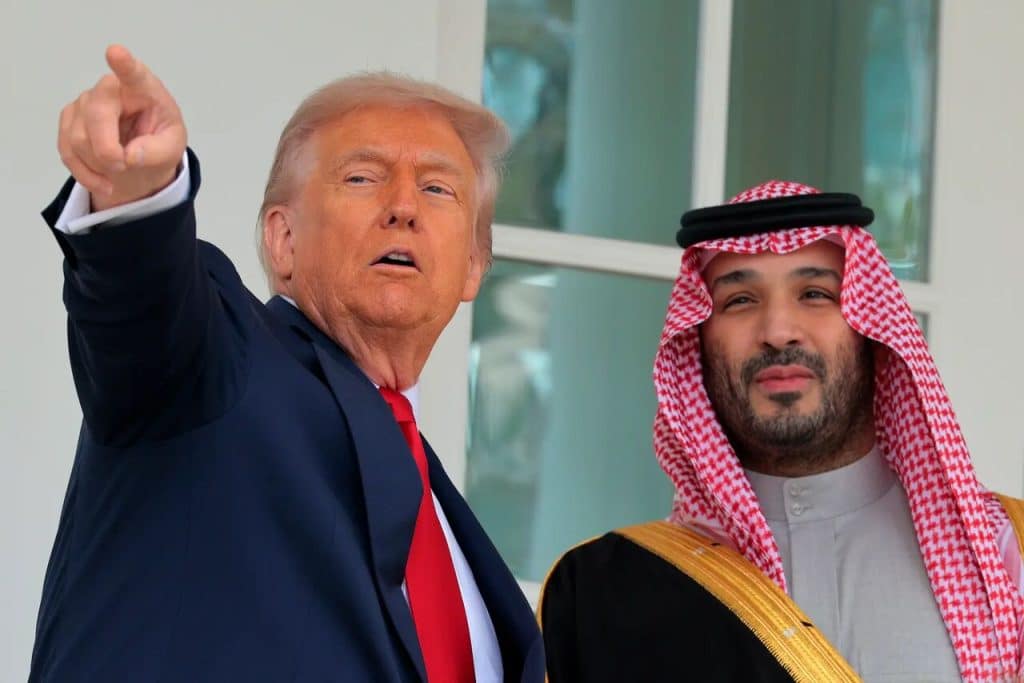White House’s bin Salman reception puts Israel on the defensive.
The White House reception for Saudi Crown Prince Mohammed bin Salman, billed as a simple business visit, was in fact the most lavish and flamboyant of Donald Trump’s presidency, and a clear statement of his foreign policy priorities. Trump welcomed the crown prince with a warm welcome on the South Lawn, complete with a sunset ceremony and a flyover of fighter jets.
Inside the Oval Office, Trump seemed so enamored with the crown prince that he shook his hand and repeatedly stressed how honored he was to be his friend. When a journalist interrupted the golden atmosphere by mentioning the 2018 murder of Jamal Khashoggi, Trump responded by fuming at the reporter and his network, ABC. He called Khashoggi “very controversial” and insisted that the prince did not know about the killing, a claim that directly contradicts the conclusions of US intelligence agencies.
Trump’s disregard for human rights and his apparent fondness for authoritarian regimes are nothing new. But what stood out most prominently during the meeting was the display of F-35 fighter jets over Washington. Trump approved the sale of the advanced fighter jets to Saudi Arabia without any conditions and with specifications that are on par with Israeli ones. The move runs counter to a long-standing tenet of US-Israeli relations—Israel’s military “qualitative superiority” over other regional allies. By declaring that both countries should be “at the forefront,” Trump made it clear that Saudi Arabia is now an ally on Israel’s level.
The language was unpalatable to Israel and reflected several recent setbacks in the bilateral relationship. In addition, the Trump administration announced that it would lift a ban on the sale of advanced artificial intelligence chips to Saudi Arabia and the UAE. The move significantly bolsters Riyadh’s ambitions to become a global technology hub. One scholar compared this potential contribution to the AI economy to the development of Saudi oil fields by American companies in the 1930s, calling it a “solid bond” between the two countries.
Other events signaled a temporary shift away from giving Israel absolute priority in West Asia policy: the introduction of a draft Security Council resolution that would point to a path to Palestinian independence, the lifting of some sanctions on Syria against Israel’s wishes, and Trump’s trip to Arab countries without stopping in Israel.
These shifts came after a high point in US-Israeli relations when Trump joined Israel in airstrikes on Iranian nuclear facilities. The attack alarmed Saudi leaders. Israeli Prime Minister Benjamin Netanyahu, who appeared to take Washington’s support for granted after the attack, went too far by bombing a target in Doha, the capital of Qatar. Trump responded in September by humiliating Netanyahu, forcing him to call his Qatari counterpart in the Oval Office and apologize.
In Trump’s “deal-seeking” White House, Israel faces stiff competition. Prince Mohammed has pledged a trillion dollars in Saudi investment in the U.S. economy. Qatar has also gifted Trump a $400 million luxury jet. The countries have also poured billions into a fund run by Jared Kushner, Trump’s son-in-law. Trump has always shown a preference for absolute rulers over elected leaders. Mohammed bin Salman has also made it clear that if the United States disappoints, his kingdom will turn to China for hardware and security guarantees.
However, some observers argue that the changes of the past few months do not represent a fundamental “reset” in U.S. Middle East policy. They point out that beneath the glitter, aspects of the talks are more superficial than they appear. For example, the crown prince has not given a timeline for the promised $1 trillion investment, and the exact number of F-35 fighter jets is not clear. Major agreements such as a bilateral defense treaty or a nuclear energy deal could be blocked by Congress. Also, Saudi normalization of relations with Israel has been made conditional on a serious commitment to the creation of a Palestinian state, something that goes beyond the vague language of a Security Council resolution.
Finally, a leading regional analyst believes that US policy in the Middle East, despite all these changes, has not fundamentally changed. He says that it is largely driven by people with a superficial understanding of the region, who take their cues from Israel and a number of regional rulers.

